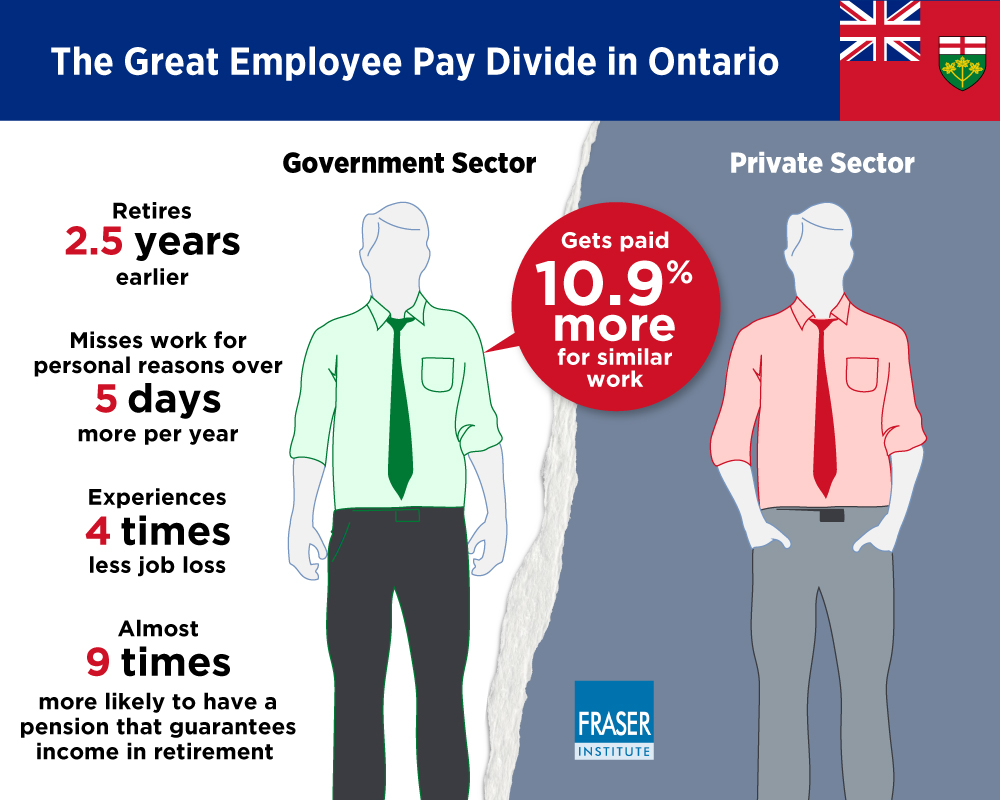Study
| EST. READ TIME 2 MIN.Government workers across Ontario receive 10.9% higher wages, on average, than comparable private-sector workers
Comparing Government and Private Sector Compensation in Ontario, 2023 Edition
Main Conclusions
- Using data on individual workers from January to December 2021, this report estimates the wage differential between the government and private sectors in Ontario. It also evaluates four non-wage benefits for which data are available to quantify compensation differences between the two sectors.
- After controlling for factors like gender, age, marital status, education, tenure, size of firm, job permanence, immigrant status, industry, occupation, and full- or part-time status, the authors found that workers in Ontario’s government sector (federal, provincial, and local) enjoyed a 10.9% wage premium, on average, over their private-sector counterparts in 2021. When unionization status is factored into the analysis, the wage premium for the government sector declines to 8.8%.
- The available data on non-wage benefits suggest that the government sector enjoys an advantage over the private sector. For example, 83.9% of government workers in Ontario are covered by a registered pension plan, compared to 25.1% of private-sector workers. Of those covered by a registered pension plan, 94.5% of government workers enjoyed a defined benefit pension compared to 36.9% of private-sector workers.
- In addition, government workers retire earlier than their private-sector counterparts— about 2.5 years on average—and are much less likely to lose their jobs (5.5% annual job loss rate in the private sector compared to 1.3% in the public sector).
- Moreover, full-time workers in the government sector lost more work time in 2021 for personal reasons (14.0 days on average) than their private-sector counterparts (8.8 days).

Share
-

Milagros Palacios
Director, Addington Centre for Measurement, Fraser InstituteMilagros Palacios is the Director for the Addington Centre for Measurement at the Fraser Institute. She holds a B.S. in IndustrialEngineering from the Pontifical Catholic University of Peru and a M.Sc. in Economics from the University of Concepcion, Chile. Ms. Palacios has studied public policy involving taxation, government finances, investment, productivity, labour markets, and charitable giving, for nearly 10 years. Since joining the Institute, Ms. Palacios has authored or coauthored over 70 comprehensive research studies, 70 commentaries and four books. Her recent commentaries have appeared in major Canadian newspapers such as the National Post, Toronto Sun, Windsor Star, and Vancouver Sun.… Read more Read Less… -

Nathaniel Li
Senior Economist, Fraser InstituteNathaniel Li is a Senior Economist at the Fraser Institute. He holds a B.A. from the Fudan University in China anda Ph.D. in Food, Agricultural and Resource Economics from the University of Guelph. Prior to joining the Fraser Institute, he worked for the University of Toronto as a postdoctoral fellow and the University of Guelph as a research associate. His past research work has been published in many high-quality, peer-reviewed academic journals, including the Applied Economic Perspectives and Policy, Agricultural Economics, Preventive Medicine, and Canadian Public Policy. His current research covers a wide range of issues in fiscal, education, and labour-market policies.… Read more Read Less… -

Ben Eisen
Senior Fellow, Fraser Institute
Ben Eisen is a Senior Fellow in Fiscal and Provincial Prosperity Studies and former Director of Provincial Prosperity Studies at theFraser Institute. He holds a BA from the University of Toronto and an MPP from the University of Toronto’s School of Public Policy and Governance. Prior to joining the Fraser Institute Mr. Eisen was the Director of Research and Programmes at the Atlantic Institute for Market Studies in Halifax. He also worked for the Citizens Budget Commission in New York City, and in Winnipeg as the Assistant Research Director for the Frontier Centre for Public Policy. Mr. Eisen has published influential studies on several policy topics, including intergovernmental relations, public finance, and higher education policy. He has been widely quoted in major newspapers including the National Post, Chronicle Herald, Winnipeg Free Press and Calgary Herald.… Read more Read Less…
Related Topics
Related Articles
Government job-growth rate in Canada vastly outstrips private sector
By: Ben Eisen and Milagros Palacios
Ford’s mini-budget keeps Wynne fiscal legacy intact
By: Ben Eisen and Jake Fuss
Wages and salaries lower in Alberta than every U.S. state
By: Tegan Hill and Alex Whalen
Ontario government chooses deficits and debt—again
By: Ben Eisen